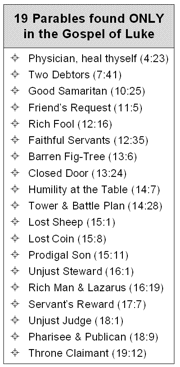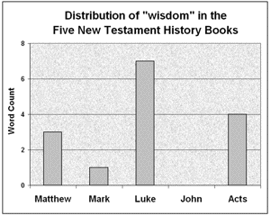Luke: The Proverbial Gospel
And he said unto them, Ye will surely say unto me this proverb,
Physician, heal thyself, whatsoever we have heard done in Capernaum, do also here in thy country.
Luke 4:23 (Spoke 20, Cycle 2)
 It
is common knowledge that Luke contains the most parables amongst the Four Gospels.
The table lists nineteen that are unique to his Book, the first being quoted above.
The word used there, translated as proverb, is the Greek parabole', the origin of the English parable.
Though the words proverb and parable have somewhat different overtones in modern English,
the corresponding Greek and Hebrew words are completely equivalent to each other. In the Septuagint,
parabole' is used for mashal in all but two of its fifty-five instances.
And what is mashal? It is the root of the Hebrew name of the Twentieth Book, Mishlei (Proverbs). It
is common knowledge that Luke contains the most parables amongst the Four Gospels.
The table lists nineteen that are unique to his Book, the first being quoted above.
The word used there, translated as proverb, is the Greek parabole', the origin of the English parable.
Though the words proverb and parable have somewhat different overtones in modern English,
the corresponding Greek and Hebrew words are completely equivalent to each other. In the Septuagint,
parabole' is used for mashal in all but two of its fifty-five instances.
And what is mashal? It is the root of the Hebrew name of the Twentieth Book, Mishlei (Proverbs).

Many of Luke's unique parables exemplify his concerns as a physician who cares deeply for the weak,
the sick, and the downtrodden. God chose Doctor Luke as the perfect brush with which to paint an incomparable
picture of the compassion, humanity, sympathy, and tender mercy of His Son.
The Parable of the Good Samaritan is perhaps the best example of the whole tenor of the Third Gospel:
And Jesus answering said, A certain man went down from Jerusalem to Jericho,
and fell among thieves, which stripped him of his raiment, and wounded him, and departed,
leaving him half dead. And by chance there came down a certain priest that way: and
when he saw him, he passed by on the other side. And likewise a Levite, when he was at the place,
came and looked on him, and passed by on the other side. But a certain Samaritan, as he
journeyed, came where he was: and when he saw him, he had compassion on him,
And went to him, and bound up his wounds, pouring in oil and wine, and set him
on his own beast, and brought him to an inn, and took care of him. And on the
morrow when he departed, he took out two pence, and gave them to the host, and said
unto him, Take care of him; and whatsoever thou spendest more, when I come again,
I will repay thee. Which now of these three, thinkest thou, was neighbour unto him that
fell among the thieves? And he said, He that shewed mercy on him. Then said Jesus unto him,
Go, and do thou likewise.
 |
| |
 |
Luke's warm, gentle, and parental spirit is seen in the infancy narratives that fill the 132
verses of his first two chapters. Of particular interest are his two descriptions of the wisdom of the young
Jesus, saying "the child grew, and waxed strong in spirit, filled with wisdom and the grace of God was
upon him" (Luke 2:40), and again, "Jesus increased in wisdom and stature, and in favour with God and man"
(Luke 2:52). These verses are unique to Luke. The latter forms a KeyLink to Proverbs selected by
the set (favour, "God and man") [Verify] . It is a strong link because the word translated
as "favour" in Proverbs is the Chet Keyword chen (grace, BW book pg 214), and this is the
standard word corresponding to the Greek charis (grace) that is translated as "favour" in Luke.
Furthermore, the verse from Luke mentions wisdom, the central theme of Proverbs, but that
word is not in the set that selects the KeyLink, so the connection is one of implication.
Luke's unique descriptions of the Christ-child's wisdom are actually part of a
larger pattern in his Gospel. The graph above shows the distribution of wisdom in the Five New Testament History Books (KJV).
Just one less than half, (seven of fifteen) appear in his Book. And of those seven, three form
unique links to Proverbs; one that was seen above, and two that are discussed in the next article (see
The Lord giveth Wisdom.)
|



